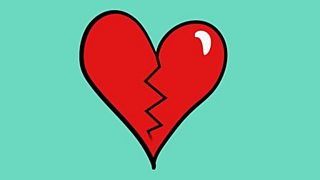How to survive being dumped by a friend
Have you been dumped by a friend? Or perhaps done the dumping? The loss of a friendship can be just as painful - if not more - than breakups with romantic partners, but society doesn’t have the same protocols or expectations around the end of those relationships.
So what’s the best way to handle the end of a friendship and how do you begin to move on? Woman’s Hour consulted the experts…

Being dumped by a friend can still be a taboo subject and carries shame for a lot of people, especially those who’ve been dumped. Several Woman’s Hour listeners got in touch to share their stories as part of this year’s Listener Week, so we set out to explore what to do when you are the friend who’s been broken up with.
“It is a form of grief when you lose a friend like that,” says journalist Rhiannon Lucy Cosslett, who has written all about friendship.
“Our friendships with other women are the defining relationships of our lives in many respects. They run incredibly deep. People tend to assume that our romantic relationships are our most significant in our lives, so when our friendships end it's underestimated how much they can affect us.”
Relationship expert Liz Pryor adds: “In romantic relationships, it's two or three weeks with a person and then there's some societal expectation that you need to let the person know you're no longer interested. But in female friendship that doesn't exist. You don't really have to, so often we don't, and it really is leaving a mega trail of pain.”
Melanie’s story: ‘She said she didn’t need me in her life anymore’
Listener Melanie was dumped about 10 years ago by a very close friend, and says it is still very raw.

“We'd been close friends for over a decade, through the last years of university, the start of our careers, we'd been bridesmaid to each other and had our first boys within months of one another. The issue started a couple of years after, we thought about having a second child. It sounds as if we were married to each other, but we were that close as friends.
“Very sadly my friend suffered a miscarriage, which was of course traumatic, and I supported her as much as I could. A few months later she did successfully become pregnant. My friend then realised that the pressure to have that second child wasn't coming from her, it was actually coming from her family. She took the tortured decision to terminate the pregnancy, and I supported her through that as well.
“Her dumping me sometime later was a result of my - completely unintended - insensitivity towards the wounds. Unfortunately, I did or said something that was construed as irredeemably insensitive to her. My guilt is in that I can't even remember - it was something to do with a bedroom or a bed or a cot. And that was it. A few days later I got a phone call saying, 'I don't need you in my life anymore. I don't need people who make me feel inadequate and bad.'
“The worst part is that I wasn't able to apologise, let alone apologise in person. We had final correspondence by email and we never saw each other or spoke again. I thought at the beginning ‘she'll come back to me in a few month's time, once she's healed’. I kept reaching out, ‘how are you? I hope you're doing well? Love to hear from you.’ Not putting pressure on to go back to where we were, but just to say ‘I'm thinking about you.’ But I never got anything, nothing.”
The advice: Five tips to help you handle the end of a friendship
is a relationship expert and the author of What Did I Do Wrong? What To Do When You Don't Know Why The Friendship Is Over. She shared this advice with Woman’s Hour…
1. Write it out
Sometimes just writing down all the feelings you have around the painful experience of a friend deciding to dump and end things can begin to help soothe the soul. Write everything you’re feeling and experiencing in a letter. You can decide whether to send it, file it away, or even burn it. Just getting it all out can begin to help.
If you’ve been completely blindsided with no explanation at all, a letter to your friend acknowledging the ending can be empowering. If she can’t find the nerve to state what has happened, you can and should state the reality for her. It’s a marking of the closure in a way that gives you some power, which helps in the process of healing.
2. Do not suffer in silence
Allow yourself the freedom to talk openly to others about the gravity of the experience. Share and talk it out with people you trust. Think of it as an instrumental part of helping to shift the cultural norm. We want to get this emotional pain of friendship ending on the radar so that ultimately the endings can be met with more care and thought, and with less shame and silence.
3. Don’t be too hard on yourself
What did you do wrong? Possibly nothing, this experience so often follows the internal life of your friend. Difficult as that may be to believe, it is often true. If you do feel you could have behaved better inside the friendship, learn from that. Force yourself to grow and forgive yourself, it will help you to move on.
4. Acknowledge the shame
Take note of the shame you carry around this experience, it can be so slippery and permeating. Literally try to go inside and look your shame straight in the face. It comes from places we don’t even realise. Like guilt, most shame is something we manufacture ourselves, so it requires a conscious choice to stop it.
5. You are not alone
Mostly, know that almost every woman you know has experienced this in their lifetime - if not once, several times. When it happens to us, we imagine we are the only ones. Women thrive on camaraderie, on shared experiences. There can be great solace in knowing you are not alone, and benefits to sharing the pain of it all.
I receive dozens of inquiries weekly and answer all of them, in the hope that slowly we can shift behaviour and break the silence on friendship ending. We want to move toward being able to honour the endings as we do our friendships themselves.
Listen to the full discussion on Â鶹ԼÅÄ Sounds, where you can also find every episode of Woman’s Hour.




